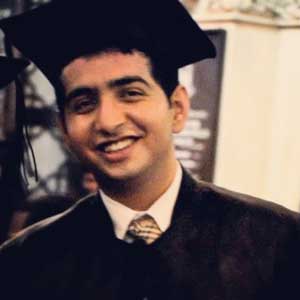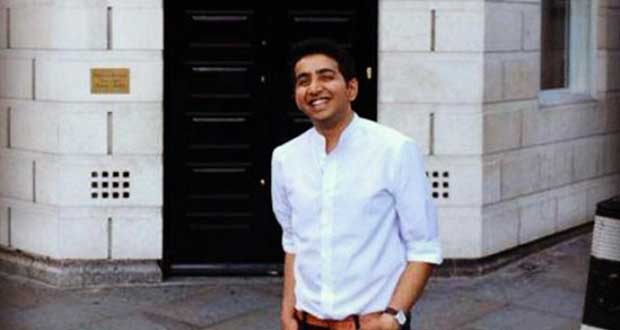Rishabh Jogani graduated with a B.L.S.LL.B. degree from GLC, Mumbai in 2012. Soon after Graduation he worked at the Chambers of Senior Advocate Pradeep Sancheti, Bombay High Court for one year and then went on to pursue a Masters in Comparative and International Dispute Resolution from Queen Mary, University of London. Thereafter he returned back to India and again joined the Chambers of Senior Advocate Pradeep Sancheti, Bombay High Court.
In this interview, he talks about:
- Moot Court Competitions and acing them
- Pursuing further studies and LL.M from Queen Mary
- Choosing litigation over other opportunities
Given that most of our readers are law students and lawyers, how would you introduce yourself to them?
I would introduce myself as a young junior counsel practising before the High Court of Bombay with a keen interest in Intellectual Property Law & Arbitration. I am working with Senior Advocate Mr. Pradeep Sancheti as his junior.
Though it’s one of the most asked questions but yet, why law?
The answer to that is with another question, why not? Despite being from a business family I realised that business was not my calling in life. I preferred something more on the professional lines and law was certainly my best plausible choice.
Tell us about your years in law school. What made your journey with Mumbai University worth it? What are the co-curricular activities you took part at Mumbai University?
I studied at Government Law College, Mumbai (GLC) the oldest law school in the country. Being at GLC itself made my entire time at University worth it considering the opportunities made available to GLC students. I was greatly involved with college activities, the Rotaract Club in particular. I was President of the Club and responsible for numerous events and activites. The College in appreciation of my involvement also awarded me with the Jotimal Chuganee Trophy for leadership.
 What were your areas of interest during your graduation? How did you go about developing expertise and knowledge in these areas?
What were your areas of interest during your graduation? How did you go about developing expertise and knowledge in these areas?
My areas of interest were Intellectual Property and Arbitration.
With regard to Intellectual Property, I did some courses from the World Intellectual Property Organisation and a Masters in Intellectual Property Law from IGNOU, New Delhi. However, the strongest addition to my knowledge in the field was an internship with Mr. Himanshu Kane of W.S.Kane & Co. who is probably one of the most knowledgable lawyers in the IP circles. Working with someone of Mr. Kane’s standing and expertise gave me great exposure to IP issues and provided me with a strong grounding with regard to IP law.
As far as Arbitration is concerned, working with Mr. Sancheti had me learn about the various intricacies of arbitral law. I was involved with numerous arbitrations and matters arising out of them. Thereafter, I pursued an LL.M in Comparative and International Dispute Resolution from the Queen Mary, University of London where I studied International Commercial Arbitration and Arbitration in relation to Energy Disputes. My LL.M thesis was also based on arbitration.
Tell us a little about your internship at the Supreme Court of India.
I interned with Mr. Justice KS Radhakrishnan of the Supreme Court during one of my summer vacations at GLC. The experience was extremely enriching, I would read cases and appeals coming to the Court and then attend the proceedings in Court. In the evenings, along with the other intern, we would have some discussions with the judge about what transpired in Court and what we understood from the cases.
After your graduation, you started working at the Chambers of Pradeep Sancheti. What influenced your decision of working with him?
My interest in arbitration drew me to Mr. Sancheti’s practice and the learning experience was extremely wonderful. Working with a Senior Advocate like Mr. Sancheti makes one realise that there is always scope to learn more. He is a great senior who besides being extremely nice to his juniors is always willing to answer all queries that come up in our minds.
What influenced your decision to work in litigation?
As a student I had interned at the High Court of Bombay and the Supreme Court of India as well as a few law firms and eventually joined Mr. Sancheti’s Chamber as an intern. I realised that I was never interested in working in a corporate structured firm and hence chose the litigation sector.
Thereafter, you joined Queen Mary, University of London for an LL.M. At what point did you decide to pursue your Masters? What was your motivation?
I always wanted some exposure to law on a comparative level and an LL.M was probably the best way to get that experience. After a year into practice at the Bar I decided to go for my LL.M. The zest for learning has probably been my strongest motivator and probably what drove me to the LL.M.
In addition to academics, what did you do during your LL.M year at Queen Mary?
Whilst at Queen Mary I was involved with ‘qLegal’ a project of the Legal Advice Centre of the School of Law. The work I did was quite interesting, in the sense that I was involved in drafting toolkits on legal issues. I was put in a team which had to draft notes on ‘Company Structure in the UK’ and ‘Trademarks in the UK’ meant for a non-legal audience. It was quite a task to simplify and explain legal terms and concepts but in the end was a rewarding experience.
I also wrote the Runner Up Prize winning paper of the Preiskel Prize Essay Competition 2013-2014 for an essay titled, “Big data and Marketing – has the law caught up with the new digital reality.”
Shortly after my exams, I worked with Zaiwalla & Co. a law firm in London. I did some very interesting work at the firm which involved research on English law and drafting litigation proceedings.
How did you choose Queen Mary over other colleges? What was the decisive factor?
The School of International Arbitration at Queen Mary is one of the best in the world and lets students study and work with famous international arbitration experts like Profs. Loukas Mistelis, Dr. Julian Lew QC, Stavros Brekoulakis and Dr. Maxi Scherer. Coupled with the fact that I wanted to live in London, Queen Mary seemed a natural choice.
While choosing a University one should look at the specific courses offered, the courses of interest, the faculty and its reputation. One should not choose a University wholly based on rankings because not all courses offered by the top universities would have the same kind of academicians.
The Universities in the UK employed a more wholesome approach to studying. There was certainly less classroom teaching than India but however not less learning. There was always voluminous pre-class reading that made sure that students came to lecture sessions well aware of the basics of the subject of discussion. There was a free exchange of opinion in classes and students were encouraged to express their viewpoints.
What is your view on the latest trend among law students to pursue Masters abroad? How much of a brain drain do you think this is?
Having done an LL.M myself I would certainly encourage anyone who can do one to seize the opportunity. No amount of learning is ever wasted and knowledge is something that stays with you for life. Some however, believe that a Masters abroad is easy and nothing but an expensive vacation. I would strongly disagree with that opinion for the simple reason that a Master’s degree from a reputed college is certainly not an easy task. There is a large amount of studying involved to pass the exams and extensive research that one must undertake to be able to write a thesis. If a student spends his time well then the LL.M is certainly an added advantage to his career.
A lot of law students prefer corporate jobs over a career in litigation. What is your take on this? Is it better to work in the corporate sector for a few years before starting litigation?
Corporate jobs certainly offer more money than litigation in the start and the allure of money is most understandable. Litigation in its early stages certainly is difficult, especially where finances are concerned but one reaps the reward soon after. I think that those students, who choose corporate work over litigation or vice versa, should always make an informed and practical choice, take into consideration their long term career goals and then decide what side they wish to pick. Working at a firm before joining the litigation sector is certainly advisable as it helps you deal with all facets of the profession.
How has your mooting experience been? How helpful has been mooting in litigation?
I had a tremendous amount of experience mooting for Government Law College. I represented GLC at numerous national and international moots. Mooting gets a law student as close as possible to a real Court room. There is a great deal of research and drafting involved in preparing for a moot which certainly helps one in the future at the Bar. Arguing before a moot Court also helps instil confidence in a student who eventually gets called to the Bar.
I also had the opportunity to be part of the Queen Mary team at the Oxford Price Media Law Moot Court Competition and successfully managed to reach all the way upto the semi finals. As part of our training for the Oxford Moot, our coach was kind enough to arrange for a practice round before a sitting judge of the Queen’s Bench Divison of the High Court of Justice. Having always seen the buildings of the Royal Courts of Justice as a tourist and read a catena of English decisions the lawyer inside me harboured a wish to be able to address that Court one day. Participating in the moot fulfilled an otherwise impossible wish.
Do you think the law school curriculum at the University of Mumbai requires an overhaul?
The curriculum certainly needs an overhaul at the University of Mumbai. Students are forced to study some redundant subjects to the extent of even studying some repealed statutes. There is a lot of room for improvement at the University of Mumbai. Also, internships or some sort of work experience should also be made part of the law curriculum.
























